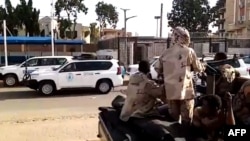U.S. special operations forces early Sunday successfully evacuated American diplomats and their families from the U.S. Embassy in Khartoum, but other countries were facing more difficulty in getting their people out of Sudan amid continued fighting between warring military factions.
U.S. officials said it took less than hour to safely evacuate about 70 Americans, sending in MH-47 Chinook helicopters from a U.S. base in Djibouti.
"We did not take any small arms fire on the way in and were able to get in and out without issue," said Lieutenant General Douglas Sims, the director of operations at the military's Joint Staff.
Other Americans could be traveling on overland routes out of Sudan. Chris Maier, an assistant secretary of defense, said the U.S. military might use drone or satellite imagery to detect any threats to them or position naval assets at the Port of Sudan to aid Americans arriving there.
Britian also announced it evacuated diplomatic staff and their families from Sudan.
More than 400 people have been killed in Sudan since fighting erupted more than a week ago between the Sudanese army and the Rapid Support Forces paramilitary group. Live TV on Sunday showed thick smoke hanging over the capital of Khartoum, with gunfire heard in some places.
The warring sides accused each other of attacking a convoy of French nationals, with both saying one French person was wounded. France’s foreign ministry had said earlier it was evacuating its diplomatic staff and citizens.
The Sudanese army accused the Rapid Support Forces of attacking and looting a Qatari convoy heading to Port Sudan. Doha released no immediate statement on any incident.
Egypt said a member of its mission in Sudan had been wounded by a gunshot, without giving details. But Saudi Arabia said it had already evacuated Persian Gulf citizens from Port Sudan on the Red Sea, 650 kilometers from Khartoum, and Jordan is planning to use the same route for its nationals.
U.S. President Joe Biden said the United States was temporarily suspending operations at its embassy in Khartoum and called for an end to the fighting.
"The belligerent parties must implement an immediate and unconditional ceasefire, allow unhindered humanitarian access, and respect the will of the people of Sudan," Biden said in a statement.
The fighting started April 15 in Khartoum, as well as in the adjoining cities of Omdurman and Bahri and elsewhere in the country, four years after long-ruling autocrat Omar al-Bashir was toppled during a popular uprising.
ICRC: Fighting in Sudan Puts Civilians, Refugees at Risk
The army and RSF jointly staged a coup in 2021 but fell out during negotiations over a plan to form a civilian government and integrate the RSF into the armed forces.
In recent days, the army under Abdel Fattah Burhan and the RSF, headed by Mohamed Hamdan Dagalo, known as Hemedti, have ignored cease-fires they have supposedly agreed on, including a three-day truce for the Muslim holiday of Eid al-Fitr, which began on Friday. Eid-al-Fitr marks the end of the Muslim holy month of Ramadan.
Battles have continued around the army's headquarters in central Khartoum and the airport, which has been closed by the clashes, and over the past two days in Bahri, where the army has used troops on the ground as well as airstrikes to try to push back the RSF.
The RSF said on Sunday that its forces were targeted by airstrikes in Bahri's Kafouri district and that dozens were "killed and injured."
RSF forces were heavily deployed in the streets and on the bridges across the capital, with army troops visible in parts of Omdurman. Neighborhoods were otherwise largely empty of civilians and ordinary life.
Some material in this report came from Reuters.




